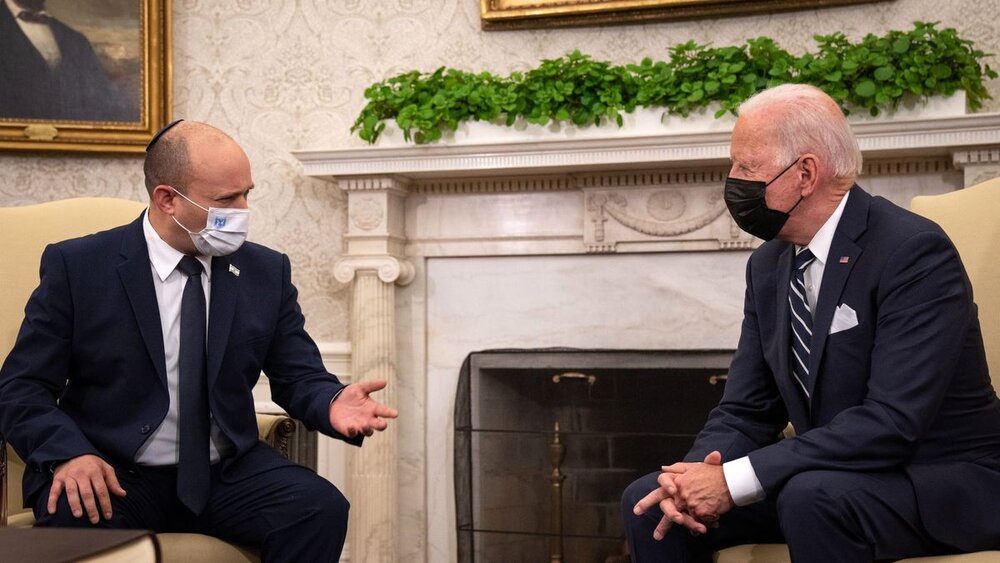Plan B is not a new proposition in international relations and has been defined many times by different countries, especially the big powers, with specific targets and purpose s and has been used in relation with other countries. This plan has been repeatedly proposed by the United States, Europe and the Zionist regime against Iran in recent years. For example, in 1392 (2013-2014), coinciding with the final months of Obama’s first term in office, the “New US Security Center” announced that if Iran’s containment strategy is failed, Plan B would be implemented as an alternative plan to counter the Islamic Republic of Iran.
The Zionist regime, the pioneer of Plan B?
Recently, Plan B was formally proposed by the Zionist Defense Minister Benny Gantz. He told Foreign Policy last September: Israel wants to do Plan B. Israel does not have the ability to lead a real Plan B, we cannot create an international economic sanctions regime. This project must be led by the United States.
Speaking at the Carnegie Endowment for International Peace, the US special envoy for Iran, Robert Mali, said in September: We are ready to adapt to the fact that we are dealing with all options to address Iran’s nuclear program – in the event that the country refuses to return to its limits (in the Joint Comprehensive Plan of Action [JCPOA]), we are working on Plan B.
Feasibility study on implementation of Plan B
Given the background of the US Plan B regarding the Islamic Republic of Iran, as well as citing statements by the US and Zionist officials about the need to implement Plan B against Iran, the plan cannot be outside the following frameworks and measures:
1- A plan for the post-JCPOA period
The Plan B is designed for the “post-JCPOA period” when the Vienna talks fail to reach the desired results and all parties withdraw from it. However, despite the Zionist regime’s extensive media, political and security efforts to overthrow the JCPOA, there are still no reliable data and accurate estimates that the JCPOA will be overthrown; rather on the contrary, the existing evidence indicates that the parties emphasize the revival of the JCPOA and implementation of the obligations of all parties.
2- Intensification of sanctions
Economic pressure in the form of “tightening sanctions” is a key part of Plan B. In this context, two guidelines are aimed at the complete collapse of the Iranian economy: first, identifying the loopholes and ways that are circumvented in the sanctions and trying to block them. Second, to put pressure on countries that have oil and economic exchanges with Iran under sanctions, including Asian countries, especially China.
Advancing such policy has not been easy in practice and is somewhat impossible. Because the most unprecedented sanctions in the history of international relations imposed on the Islamic Republic of Iran, despite the problems they have created for the people, have not been able to bring about the collapse of the Iranian economy.
3- Diplomatic pressure and political isolation
“Political isolation” is another tool of Plan B that has not been very effective for Iran for two reasons; first, regional and international conditions have deprived the United States of any consensus-building power against Iran. Secondly, the efficient foreign policy of the Islamic Republic of Iran, as well as having national, regional and global capacities and benefiting from skilled diplomats, have faced the Iranian isolation project with significant obstacles.
4- Presenting diplomatic proposals
Plan B also includes some “diplomatic proposals”. In this regard, Michael Singh, Senior Director of Middle East Affairs at the National Security Council of the George W. Bush Administration, by publishing a note in the Foreign Affairs has proposed to the Biden administration: Under this plan, Tehran’s officials should be presented a diplomatic offer to the effect that they will have a better chance of surviving by cooperating with diplomatic efforts to resolve the nuclear issue.
5- Industrial sabotage and cyber attacks
Attempts aimed at carrying out “industrial sabotage” at nuclear facilities and “cyber attacks” are the next propositions in Plan B. Of course, the Islamic Republic of Iran has faced such measures for years (assassination of nuclear scientists, theft of nuclear documents, sabotage at nuclear facilities, cyber attacks on fuel systems, etc.), but experience has shown that such acts, despite the possible damage to Iran, have also been costly for the perpetrators and have not led to their desired and expected results.
6- Decisive military threat
It is sometimes said that a “decisive military threat” is among the propositions in Plan B. Defined on both a limited and pervasive level, the move could not be a viable option for Washington, given its dire consequences. Even the Pentagon and the US intelligence agencies have come to the conclusion that attacking Iran will come at a high cost, estimating their operational challenges, combat capability, financial and economic resources, managing the consequences of war, and public opinion sensitivities.
Concluding remarks
Given the failure of the maximum pressure strategy, which even officials of the current US administration have acknowledged, it is unlikely that with the alternative means, the Islamic Republic of Iran could be placed between the two options of the survival and nuclear program. The use of a plan, an important and key part of which is the “tightening of sanctions”, has no suitable effect on a country that has learned to deal with sanctions.
The repeated discussion on Plan B in the media, political and security atmosphere, is more with an aim of creating psychological warfare and influencing the Vienna negotiation process. Therefore, it seems that this plan, as much as it is seen in the psychological and media atmosphere, does not exist in the real and true space.










0 Comments